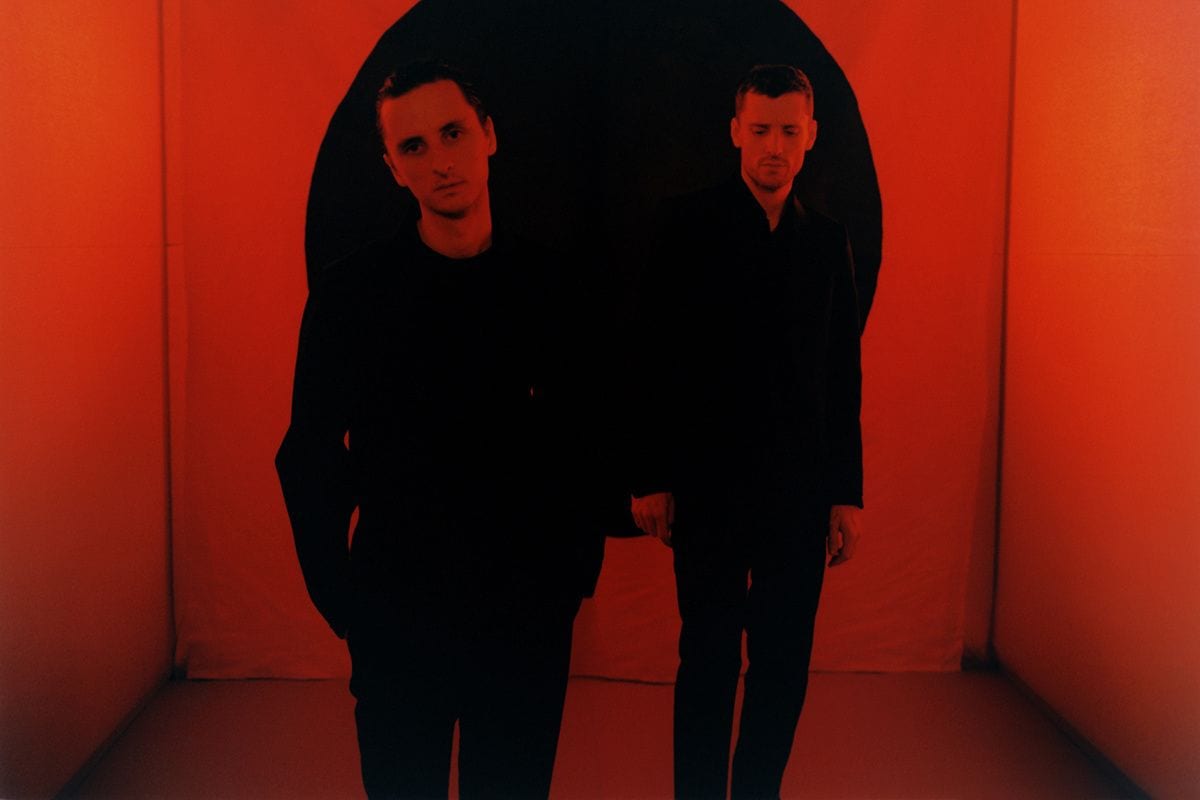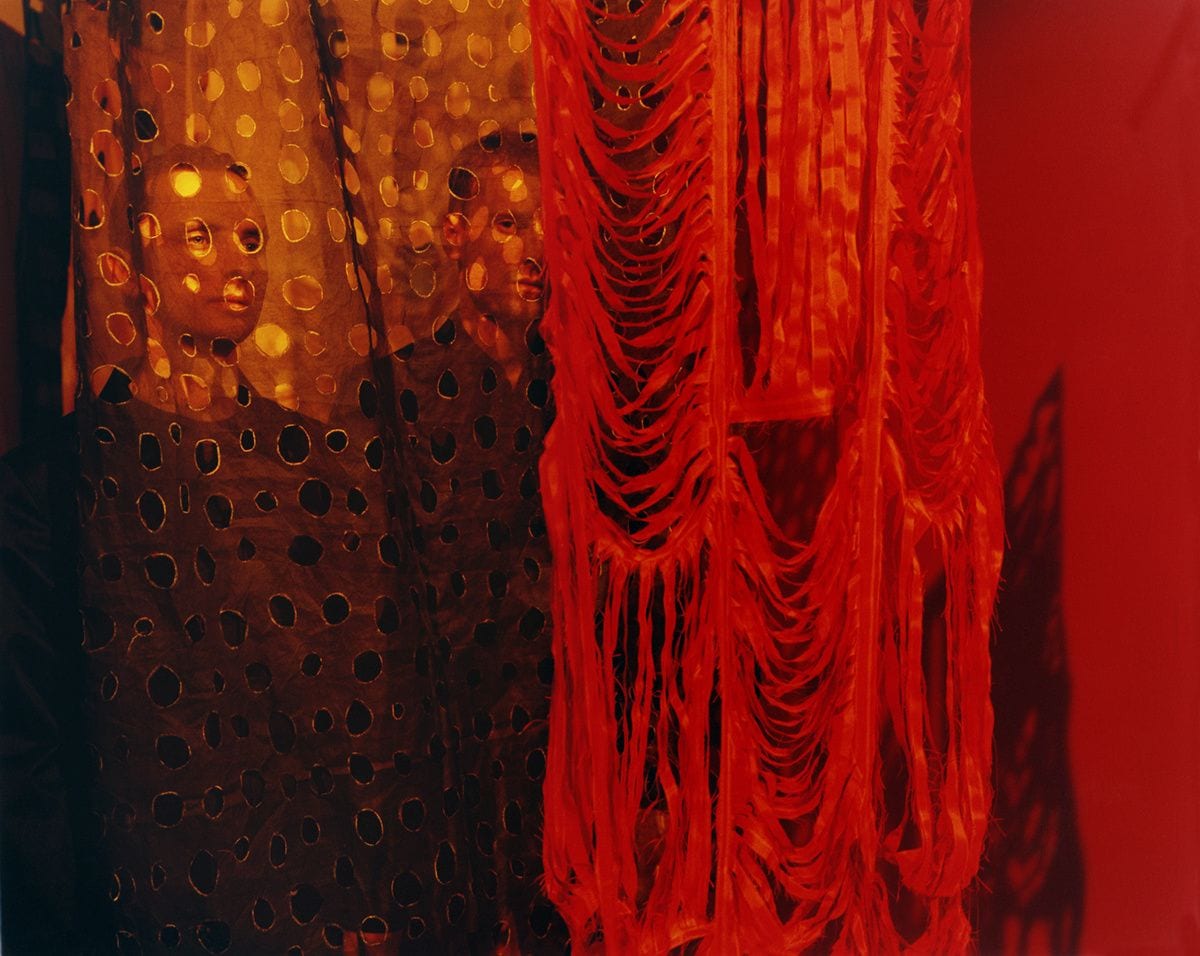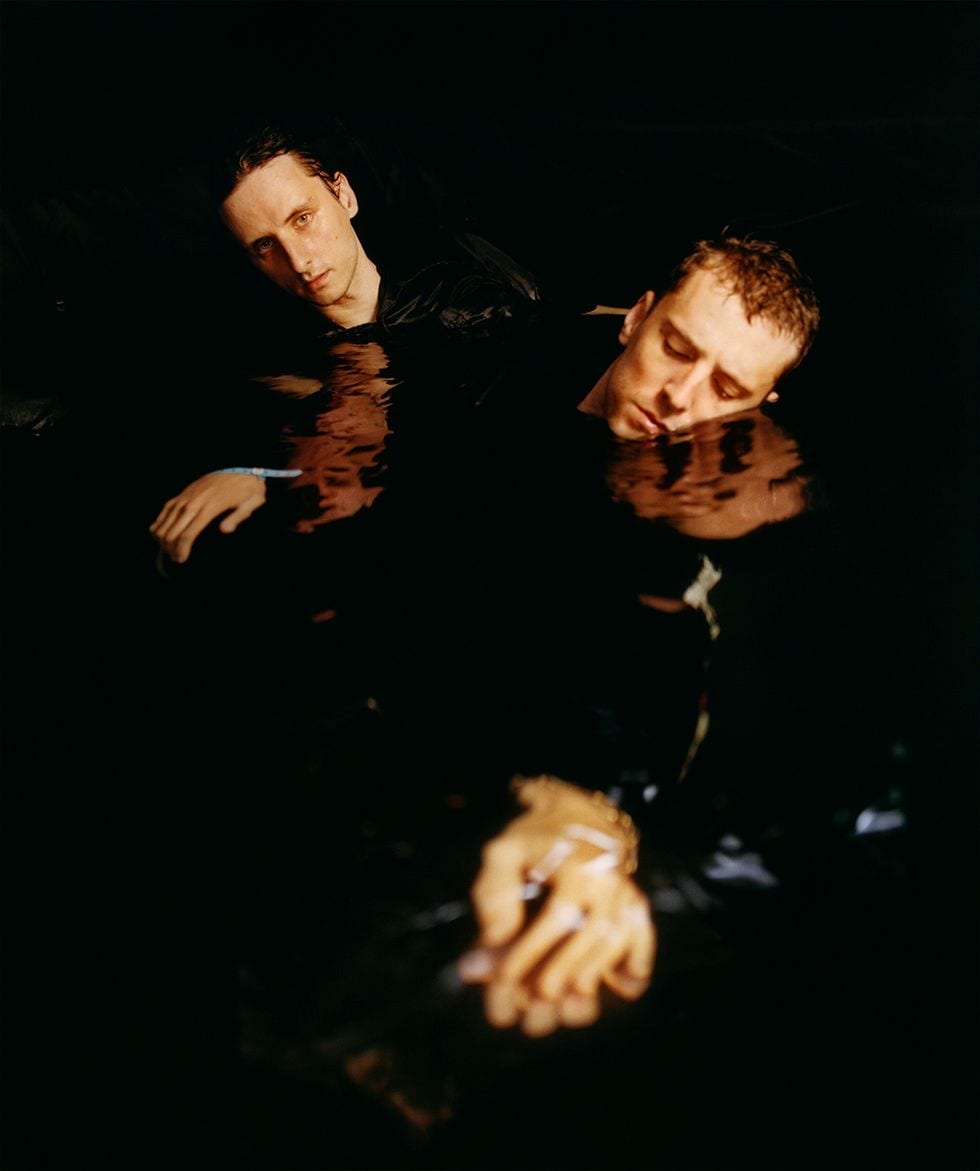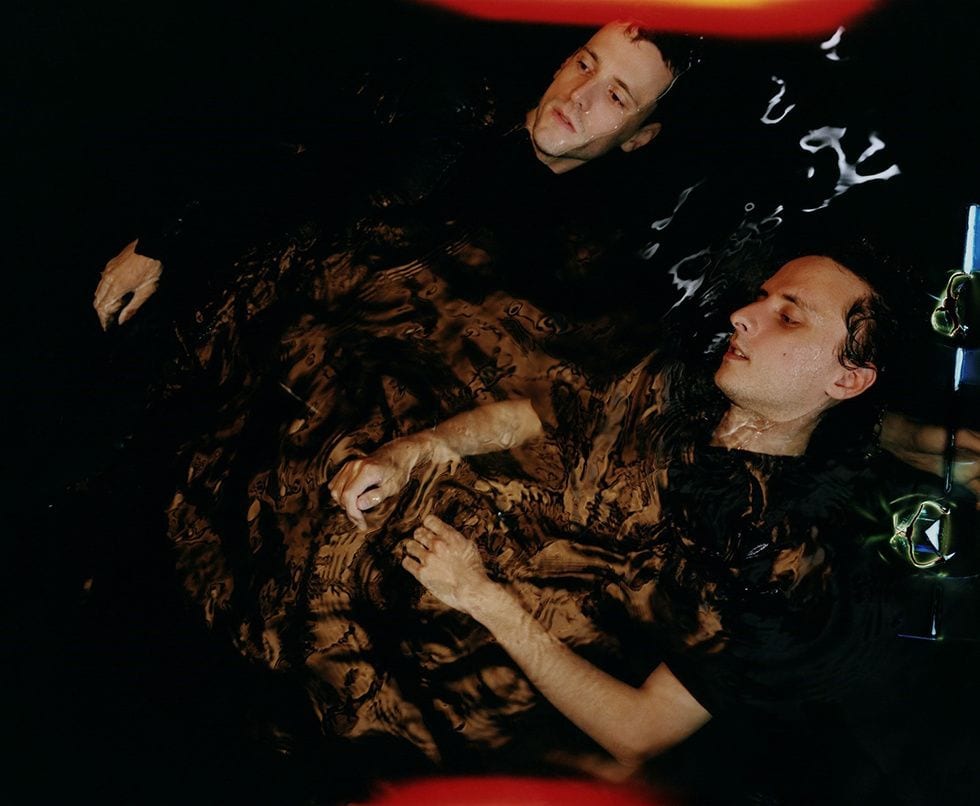
Not that long ago, only about a decade past, These New Puritans‘ Jack and George Barnett were engaged in a brash, percussive, rhythm-centered maximalism that sounded like 12-tone music performed by hip hop artists (2008’s Beat Pyramid). From there, the two took a meandering path through Reichian compositions for woodwind ensembles (Hidden, 2010), and large scale, contemporary classicism (Field of Reeds, 2013), eventually arranged and performed for a 35-piece orchestra. Now with Inside the Rose, the Barnetts have again pared back to essentials, performing new material in a five-person ensemble including electronics, vocals, synthesized strings and lots of percussion.
Asked about this unusual artistic journey, George Barnett admits that there was never much of a plan behind it. “It was just what we naturally did There was no sort of thinking about it. It’s just like what happened next,” he says.
“It’s the extremes,” he adds, pinpointing what’s different about the new sound. “The pop bits are more pop and the extreme bits are more extreme.”

Lost in a Strange, Overwhelming State
Inside the Rose envelopes the listener in an alternate reality, the sounds hyper clear and resonant but somehow detached from ordinary reality. “Where the Trees Are on Fire”, the album’s centerpiece, vibrates particularly with this hallucinatory energy. It is no surprise to find out that Jack Barnett wrote it at least partly based on a dream.
“Yes, I sometimes dream music,” he says when asked about his nocturnal process. “I will caveat that by saying that most of the time it’s not very good! Bad 1980s synth pop, second rate pub rock, etc. but sometimes it works, for example with the song “Where the Trees Are on Fire” — I dreamt the melody and most of the lyrics for that.
“A few years ago, I noticed I was dreaming lots of music,” he continues. “Then I’d wake up and I’d have forgotten it. So, I started sleeping with a Dictaphone next to my bed — a mechanical one because phones take you out of the dream state too much — and I’d wake up in the night and try to sing the music I’d heard, and record it,” he explains. “Often in the morning when I listened back, it would be completely incomprehensible to me, I wouldn’t understand what had struck me so much in the dream. but then sometimes you hear enough to remember what was so powerful in the dream.”
“I haven’t been dreaming so much music recently though, I don’t know why,” he adds.
For Jack Barnett who writes most of These New Puritans’ melodies and lyrics, the dream state has a lot in common with the creative one. “I always think the best moments of working on something, for example, a song, have a lot in common with dreaming. When you really have momentum. It’s hard to say what exactly. You’re lost in a strange overwhelming state which goes beyond your rational understanding. it’s a good feeling,” says Jack Barnett.

Lush, Vibrant Sound
Nearly 50 musicians played on Field of Reeds, including orchestral ensembles and adult and children’s choirs. Inside the Rose’s credits are similarly expansive, including about 35 people, but the music feels more streamlined. Says, Jack Barnett, “I wanted the music to be sharp and clear. I think the best art is absolutely clear but absolutely mysterious.”
These New Puritans again tapped the Stargaze Ensemble for strings (they had performed on Field of Reeds as well), layering sound on sound for a dense saturated sound. Says George Barnett, “We used three, three, three, that is three sets of violins, viola and we used three double basses which is a real rarity. If these strings tune in threes, you get this thick lush low end. We spent a lot of time and got really good people, really good engineers making that sound.”
The album also includes quite a lot of vibraphone, starting right from the top with “Infinity Vibraphones”. Jack Barnett, who plays the vibraphones on the record, explains how he became fascinated with the instrument. “On the Hidden live shows, which we played at the Barbican and Pompidou Centre, for the last song, I went to the back of the stage with the percussionists. Three vibraphones stood in a line, and I played vibraphone … three interlocking patterns. That’s the first time I’d played them.”
“I hadn’t really played them since then, back in 2012, before it came to recording. I learned the parts on keyboard before recording and just trusted I’d be able to pull it off! if you play drums and keyboards, you’re alright because it’s sort of a combination of the two,” he adds.
“Vibraphones are such beautiful things to look at, and I love the sound — when you play softly, they sound so pure, like a tone-generator making a sine wave, but with all kinds of minute imperfections and strange little characteristics.”
Haunting Voices
Inside the Rose teems with voices, not just Jack Barnett’s indie pop croon, but an array of guest singers. Between booming, reverberating drum lines in “Into the Fire” you can make out David Tibet’s distinctive chanted poetry (“We sang like roses/at the fire within/and split great sunbursts/at paths of spheres/changing wings/splitting the lie/open your heart/scatter the sky”). The ghostly vocals of Taiwanese electronicist and singer Scintii float through “Infinity Vibraphones” and “Beyond Black Suns” (she will also be touring with These New Puritans), while Irish mezzo-soprano Michelle Daly and Synergy Ensemble’s Micaela Haslam add aria-like codas to “Beyond Black Suns.” Elisa Rodrigues, a Portuguese jazz singer who also contributed to Field of Reeds, sings again on “Infinity Vibraphones” and “Inside the Rose.”
“I love singing in dialogue,” says Jack Barnett, when asked about the preponderance of vocal gorgeousness. “If I’m singing with someone who has a beautiful, pure voice, it means I can be uglier — I like the beauty/beast contrast.” He adds, “I like all different voices to express different perspectives. If a melody comes to mind which doesn’t suit my voice, then we have to find someone else.”
“Scintii is absolutely mega, her voice,” says George Barnett. “There’s a breathiness. You can really feel that she’s engaged, and there’s a certain sense that you’re drawn in. There’s a very good tone.” He adds that he is very excited about Scintii joining the live show. “She’s going to sing that and sing songs with us. I can’t wait. That’s the exciting part,” he says.
David Tibet of Current 93 and the band have been friends for a long time, both brothers explain. “I think Jack asked him a question about something in one of his songs several years ago, and he came right back to him and was like, ‘Yeah, I really like your record,'” says George Barnett. These New Puritans ended up opening for Current 93 in South London in 2010 and the relationship developed from there. “I think he’s probably the best living lyricist,” says George.
“He’s a funny guy. He’s not what you’d imagine him to be. He’s just fun. He’s a really fun guy, really positive,” says George.
“I think people expect him to be a bringer-of-the-apocalypse, but I’ve found that the more ‘serious’ the music, the less seriously the people take themselves,” adds Jack Barnett.
The new album is both complex and instantly accessible, its dense arrangements supporting what are, essentially, pop hooks. Both Barnett brothers have favorite moments from it. For Jack, the immense, radiant, reverbed sound that opens up on “A-R-P” after he sings the lyric “together we can fly” and the percussion on “Black Suns”. “It’s these thin aluminum sheets being hit with metal rods and being bent, to change the resonance and decay of the sound,” he explains. George Barnett also savors parts of “A-R-P,” the drum arrangement at its end, the sweeping middle chorus. “I like anything where you feel lifted or taken away from everything,” he says.
George Barnett says he thinks people view pop music far too narrowly in the current era — that oddball, challenging music can have commercial appeal as well. “People have some strange ideas related to commercial music. This album is commercial. They’re just looking at it from the wrong end,” he says. “I would love if people would push themselves to listen to something other than mediocre music by committee, streaming stuff. This is direct strong ideas played out with good melody.”

Just Melody and Rhythm
These New Puritans were gearing up for a European tour when we talked. They’d like to head to America later in the year. George Barnett says that the transition from studio to stage has been very easy this time. “It’s just melody and rhythm. There’s a vibraphone on stage. There’s another kind of vibraphone. Different drum arrangements. Electro-drums. Lots of different pianos and synthesizers and sequencers. There’s four of us on stage or five. We’ve got the additional singer. It’s so fun. It’s flexible and agile. We can do stuff. It’s a proper band. It’s the best, I think, the best version of TNP,” he says.




